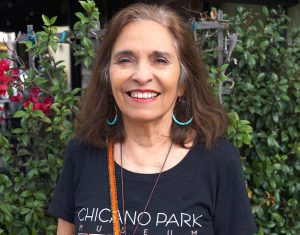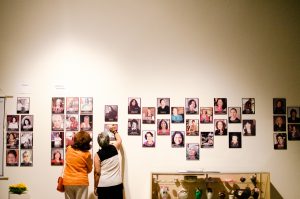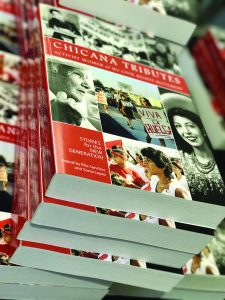Rita Sanchez: Writing is Revolutionary

Although life took her through unexpected paths, Rita Sanchez has used her passion for writing to help students succeed in education and to preserve the stories of women who helped shape history.
Sanchez, who is the co-editor of “Chicana Tributes: Stories for the New Generation,” a collection of stories of 61 Chicana activists in different fields like education, arts, and public offices, did not plan on becoming a pioneer of Chicana empowerment, but she did.
The seventh of 11 children, Sanchez hoped to go to college and pursue a career in journalism until a school counselor told her she should abandon that dream because of her family’s economic status and should instead pursue a career as a secretary.
“As a 16-year old I just gulped and took it, but I was determined so I kind of ignored her and just kept studying,” Sanchez said.
She attended San Jose State University but dropped out after getting married at the age of 20, which she said seemed like the normal thing to do because of the traditions in her family and the roles that women were expected to fill during those times.
Sanchez worked to put her husband through his undergraduate school and law school, but sadly after 10 years of marriage they were divorced.
“I didn’t want to go home broken and a failure because I had not sustained my marriage,” Sanchez said.
Feeling that the traditional path she followed did not work out for her, Sanchez, now a mother of two, decided to go back to school.
She attended Foothill Community College and transferred to Stanford University during the 1970s.
Her first day at the university, she recalls there was a meeting to announce that the National Chicano Moratorium March, an anti-Vietnam war march in Los Angeles lead by Chicanos, had happened and three individuals had lost their lives.
Although she wanted to focus solely on her education, she found herself in the middle of a revolutionary movement that she could not ignore.
“You can’t escape history and you can’t escape racism that is thrown in your face wherever you go,” Sanchez said. “If you’re a product of being a person of color, being bicultural, or bilingual, no matter where you are you’re going to have to face it.”
She obtained her bachelor’s degree in English literature and her master’s in Education and Literature in 1973. She was invited to take part in the Chicano Affairs Advisory Committee to the President of Stanford and helped in the process of hiring its director.
She was the first woman to receive the Stanford Chicano Fellowship and the first to teach a course about Mexican-American women at Stanford and also taught a course in writing from a Chicano perspective.
Sanchez said that her work and everything she did was a result of the struggle minorities were facing during that part in history.
Although she was becoming the first in many aspects, she recalls that she felt she was not doing enough because she could not do the activism that other students were doing due to the responsibility of raising two children.
However, she found her own kind of activism after attending a conference where she decided to say that writing itself was revolutionary and Sanchez said that concept has followed her throughout the rest of her life and has shaped her work.
“Going in the streets was revolutionary, but writing was just as revolutionary because we needed to write to come up to where we had lost, we needed to publish, we needed to get a better education,” Sanchez said.
Her 1970s essay titled “Chicana Writer Breaking out of Silence,” which was later reprinted as “Writing as a Revolutionary Act,” became her way of joining the revolution.
Sanchez taught for almost ten years at San Diego State University and in 1990, now a mother of four, she began working a Mesa College where the concept of writing as a revolutionary act resurfaced.

She said she noticed many students were not transferring out of the community college because they could not pass the writing exam. She decided to work with each student and helped hundreds of them to transfer.
“I don’t think I drew upon my writing as a revolutionary act,” Sanchez said. “I think I just began to feel for these students.”
She worked one on one with each student and helped each one identify what they were lacking or what mistakes they were making that were keeping them from passing the exam. She said that once she began to work with those students she felt she had a real mission in life.
“Everybody fights for something, and everybody cared about students passing, but I really took it on to get students to pass in order to transfer,” Sanchez said.
Now retired, Sanchez continues her work by using writing as a revolutionary act to preserve the stories of Chicana women in San Diego through her work with the Chicana Archive Committee with her husband Richard Griswold del Castillo.
During an event to fundraise for the archives, Sanchez put up a “Tribute Wall” made up of pictures of women in San Diego and because it had such a positive reaction from the people at the event, she came up with the idea of making a book.
“It made all the young women really proud to know that they had a history and that there’s other women like them,” Sanchez said.
Through the book, “Chicana Tributes: Stories for the New Generation” the stories of each of those 61 women is being preserved. The book was co-edited by Sanchez and Sonia Lopez and authored by 61 women.
Sanchez hopes that women will read those stories and be inspired to share the stories of other women who have made an impact in history.







